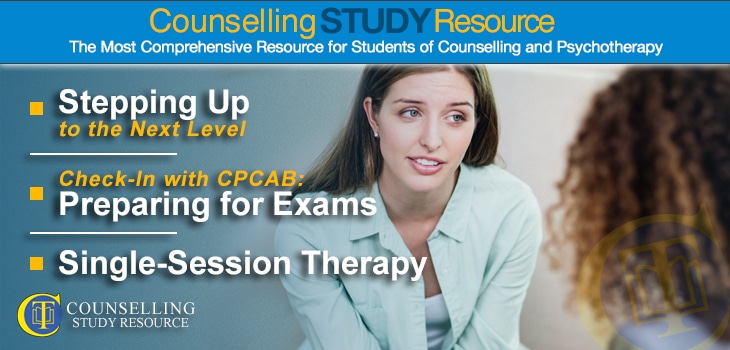150 – Single Session Therapy
Stepping up to the Next Level – Preparing for Exams
In episode 150 of the Counselling Tutor Podcast, Ken Kelly and Rory Lees-Oakes talk about what to expect when you move up to the next level of counselling training. ‘Check-In with CPCAB’ then focuses on external assessment, and how you can best prepare for this. Finally, in ‘Practice Matters’, Rory interviews Professor Windy Dryden about single session therapy.
Stepping up to the Next Level (starts at 1.50 mins)
A frequent question in the Counselling Tutor Facebook group is about what it’s like to move up to the next level of counselling training. If you’re not already a member, do come along and chat to over 30,000 others interested in the world of counselling and psychotherapy (including students, qualified practitioners, supervisors and tutors).
In the UK, Level 2 counselling courses (an introduction to counselling) are usually about 10–15 weeks long.
Level 3 courses (focusing on counselling skills, but also including some theory and personal development) are one year, while Level 4 (qualification level) is a two-year training.
It’s important to think ahead as to whether you will be able to commit the amount of time and energy needed to complete all parts of the course satisfactorily.
For example, at Level 4, this includes the contact time, writing assignments, going to your placement, and having supervision.
Personal therapy may also be a requirement of some Level 4 courses, supporting the big emphasis on self-awareness and personal development at this stage of training. Rory describes the workload of Level 4 as like having an additional part-time job.
Having said all this, the training is very enriching and worthwhile. As Rory puts it, it’s like a long but interesting trek up a hill – and the view when you get there is just beautiful!
The trick is not to look too far ahead: instead, enjoy every step of your journey.
Rory has written a checklist on moving up to the next level; this is available here, or you can get hold of it through the Handouts Vault and Counselling Study Resource (CSR).
The CSR is a great place for you to find support with your course – over 40,000 students have already used it to help them achieve their learning outcomes.
Check-In with CPCAB: Preparing for Exams (starts at 13.05 mins)
Rory talks to Kelly Budd (Head of Qualifications) at CPCAB (Counselling & Psychotherapy Central Awarding Body) about hints and tips to reduce exam stress when approaching your external assessment.
Here are some of the ideas she suggests:
- Try to let go of any transference from school days: CPCAB tries hard to design the external assessments to feel very different from school exams (in a good way!).
- The exam will only ever ask you about what you have been taught on the course: all questions are based on the learning outcomes for the particular course.
- Read the guidance booklet produced by CPCAB (it’s on the website, and your tutor may well give you a copy).
- Be well prepared: revise as much as you reasonably can, while not neglecting your wider wellbeing and self-care.
- Start your revision with any areas you feel weak on. Your goal is to enter the exam with an understanding that is balanced across the curriculum.
- Remember that neither CPCAB nor your tutor is trying to catch you out: they really want you to pass!
- Use the mock exam (and the debriefing afterwards) that your centre will organise as a ‘dry run’ for the real thing.
- Use calming techniques that work for you – for example, mindfulness, breathing practices or chatting/laughing with friends.
- Once you’re in the exam, read the question properly, especially the verb – does it tell you, for example, to describe, evaluate or compare?
- Last but not least, if you give it your best go but don’t pass first time, try not to be disheartened: you can resit and will likely be fine then.
You can find more information about CPCAB on its website. CPCAB is the UK’s only awarding body run by counsellors for counsellors.
Single Session Therapy (starts at 30.45 mins)
In this segment of the Counselling Tutor Podcast – aimed at qualified practitioners – Rory talks to Windy Dryden, Emeritus Professor of Psychotherapeutic Studies at Goldsmiths, University of London, about the lecture he delivered recently for Counsellor CPD.
This lecture – which explains the theory underpinning single session therapy, followed by a demonstration session – was very well-received by listeners.
Windy explains the basis of single session therapy as being the provision of help at the point of need rather than the point of availability. Thus, while this approach does not aim specifically to reduce waiting lists for counselling, it does usually have that effect.
In fact, the modal (i.e. most commonly occurring) number of sessions taken up by clients of counselling worldwide is one.
While Windy’s own style – as shown in the demonstration – involves the use of questions, the single session approach is applicable to any modality.
For example, we see Carl Rogers demonstrating the applicability of the person-centred approach to single session therapy in his famous ‘Gloria’ session.
Windy invites listeners to visit his website at www.windydryden.com to register interest in training with him.
And you can hear his lecture at Counsellor CPD, which is a brand-new service aimed at qualified counsellors. There, we have over 150 hours of formal lectures, all linked to learning outcomes, delivered by experts in the field, and with downloadable slide packs and CPD certificates.
Free Handout Download
Moving up to the Next Level Checklist
